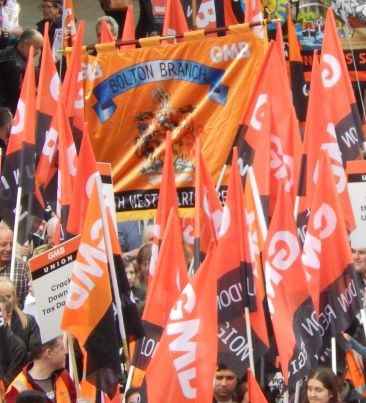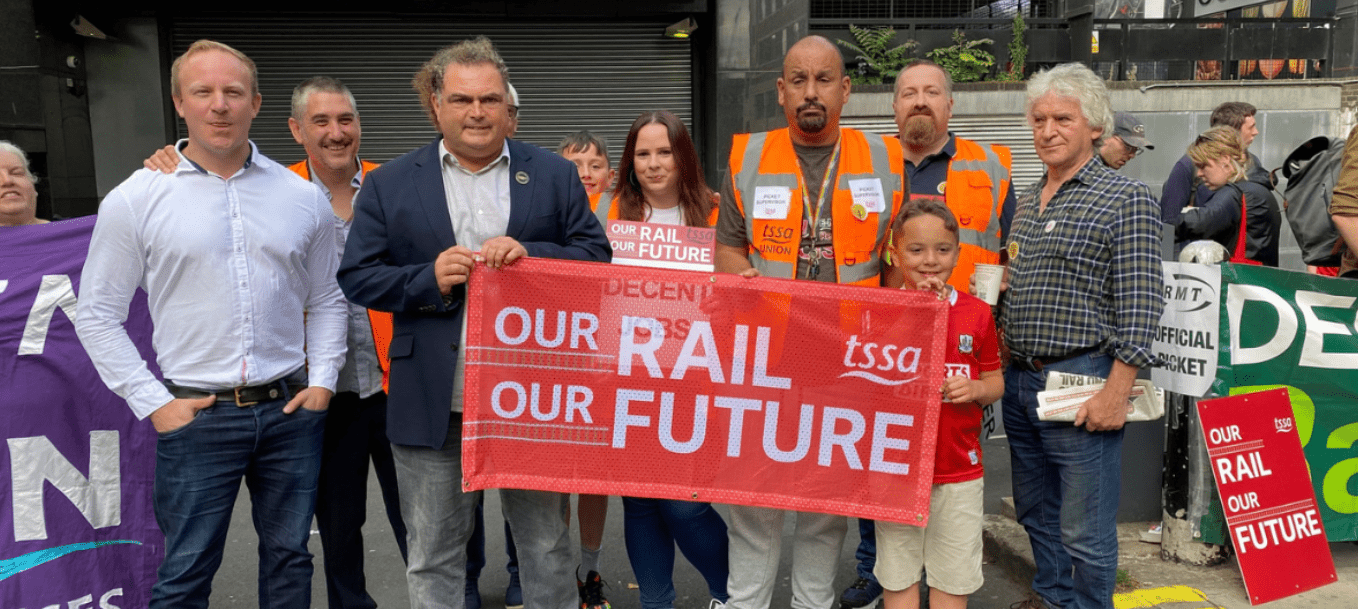For committed socialists it seems to be getting increasingly difficult to justify being a member of the Labour Party. Keir Starmer’s latest attack on the left, in a long line of attacks, is to sack Sam Tarry as a Shadow Transport Minister for having the temerity to appear on the picket line of the rail union, TSSA, for which he used to work. [Photograph above, from TSSA website, Sam Tarry on the left of the picture]
There is a growing disconnect between the bubble inhabited by Labour’s parliamentary leadership and the real-world problems being faced by workers. Unfortunately, Starmer and the Labour right-wing offer absolutely nothing to ordinary workers, nothing that is, except words. It is absolutely pointless for the Labour Party leadership to claim, as it has done in a statement, that Labour would “always stand up for working people fighting for better pay, terms and conditions at work”, if when it comes down to deeds, it turns its back.
Even this statement misses the point – that the overwhelming majority of workers currently taking industrial action or balloting for action are merely fighting to keep what they already have. By their weakness, timidity and their desperate attempt to placate the Tory media, the Labour leadership are virtually saying that workers should accept a cut in their living standards by accepting wage offers well below the rate of inflation.
Unions outraged by Tarry sacking
The reaction of trade union leaders to the sacking of Sam Tarry has been predictable. Sharon Graham, general secretary of Unite and the biggest Labour affiliate, said Labour was “becoming more and more irrelevant to ordinary working people“. TSSA general secretary, Manual Cortes, said Labour was “deluded” if it thought it could win the next election “while pushing away seven million trade union members“. Gary Smith, the general secretary of the GMB, tweeted that it was a “huge own goal” for Labour to “turn a Tory Transport crisis into a Labour story”, adding that the next election would be fought on the “back of the worst cost-of-living crisis in a generation” and that the “mood of the country is with us”.
In the latest blow to living standards, it is estimated that energy bills will leap in October to as much as £3,800 for the average home. Shares in Centrica, what used to be British Gas, rose as the company announced record profits and increased dividends to shareholders. Yet disgracefully, the Labour leadership refuses to support the call to renationalise an energy sector growing fat while working class families are impoverished. That is despite renationalisation being Labour conference policy and, polling shows, popular with the electorate.
The most significant factor in Labour creeping up in the opinion polls has been the Johnson government, the most corrupt in modern history. Political gains have been despite Keir Starmer and in no sense because of him. Indeed, few men and women in the street would have any idea what Labour’s official policy is on anything. It sometimes looks like Keir Starmer is doing his damnedest to make sure Labour will not succeed electorally.
Up to now, the trade union leaders have facilitated Starmer
The Tories are now talking about new anti-trade union legislation that will make effective strikes illegal. Yet once again, the Labour leadership are ambivalent on the issue, instead of clearly and unequivocally committing to repeal anti-trade union laws.
We have argued for some time now that the key to change in the Labour Party rests with the trade unions affiliated to it. Labour’s right wing are happy to drive out rank and file members, but they are less successful in driving away the trade unions, as the real right-wing head-bangers would like to do.

The Labour Party was built by the trade unions and has rested on its millions of affiliated members ever since. Politically speaking, the tiny and unrepresentative cabal that now leads the Party are representatives of the interests of capitalism, the bosses. That and their own personal careers.
But let us be clear: there is no damage the right wing could have done to the Labour Party in the last two and a half years – and a great deal of damage has been done – that would have been accomplished without the acquiescence of the right-wing trade union leaders affiliated to the Labour Party.
If the affiliated unions lifted their little fingers, the Labour leadership would be forced to move or get out of the way. When the Labour leadership wanted to revise the leadership election system to take it out of the hands of the membership – widely floated in the media in the weeks before last year’s Labour conference – a single meeting of TULO, the organisation of the eleven affiliated unions, was enough to scupper the plan. Without the active support of trade union representatives on Labour’s NEC, the huge shift of the Party to the right would not have taken place.
We have too many trade union leaders loudly proclaiming their union policy on the one hand – like a £15 an hour National Minimum Wage – but actively propping up a leader who is opposed to those policies. That is an unsustainable policy for the union leadership.
Unions should take their affiliation seriously
For those trade unions that are outraged by the sacking of Sam Tarry and Starmer’s refusal to support workers in struggle, there are strategies that can be followed. One policy is to become ‘apolitical’ and walking away. That is a policy hinted at by the Unite leadership, for example. It is not even clear if the Unite reps on Labour’s NEC attend meetings, let alone put up a fight.
Turning away from trying to assert a political influence is not the answer. The affiliated unions should instead conduct a determined and sustained campaign to win back the Labour Party and to ditch Starmer. The unions have the political funds and facilities to have regular political schools, to organise for the maximum number of union activists to become Labour members and for them to caucus and work together consistently to reclaim the Party at local, regional and national level.
Properly organised, coordinated and sustained, and above all involving tens of thousands of union activists, a trade union intervention in the Labour Party could make a massive difference and could open up the possibility of winning it back to socialist ideas. There has never been a greater need for the Party to adopt socialist ideas and policies in the interests of working people.
There are two fundamental possibilities for the Labour Party. On the one hand, the Party could lose the affiliation of several of the larger unions, with the likelihood then that they would go off into the political wilderness, rather than organising an ‘alternative’ workers’ party as has been suggested. Or, on the other hand, the pressure of the membership facing the biggest cut in living standards for generations (as well as draconian anti-union laws) will force the unions into conflict with the Labour leadership.
We still believe that the second possibility seems the most likely and it is for that reason, and that reason alone, that it is still correct for socialists to face towards the Party. But the sooner that process begins, the better.



